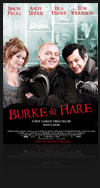
| Capsule Review
Burke & Hare (2011)

Directed by John Landis.
Cast: Simon Pegg, Andy Serkis, Isla Fisher, Tom Wilkinson, Tim Curry, Jessica Hynes, Ronnie Corbett, Hugh Bonneville, Stephen Merchant, Bill Bailey, David Schofield, Pollyanna McIntosh, Georgia King, Amanda Claire, Shelley Longworth, Allan Corduner, Michael Winner, Jenny Agutter, Christopher Lee.
2011 – 91 minutes
Not Rated: (equivalent of an R for violence, sexual content and language).
Reviewed by Dustin Putman, September 4, 2011.
|
John Landis, acclaimed director of 1978's "National Lampoon's Animal House," 1980's "The Blues Brothers," and Michael Jackson's 1983 "Thriller" music video, has fallen on hard times in recent years. Either the spark he once had for filmmaking is gone, or he simply has chosen consistently poor material to work from. Whatever the case, "Burke & Hare" is a blundering misfire that somehow manages to waste both a quirkily macabre premise and an ensemble of usually outstanding character actors on a depressing comedy with maybe one fleeting laugh to offer over the course of 91 minutes. Watching the film is an icy, monotonous experience, made all the worse by screenwriters Piers Ashworth's and Nick Moorcroft's flippant disregard for their characters. They so delight in seeing each and every one of them suffer that, by the end, the audience is in misery right along with them.
 |
"This is a true story, except for the parts that are not," reads the dopey introductory card that sets up right from the start the level of high wit the movie is working with. In 1828 Scotland, William Burke (Simon Pegg) and William Hare (Andy Serkis) are professional ne'er-do-well schemers who begin robbing graves and murdering townspeople when Dr. Robert Knox (Tom Wilkinson) of Edinburgh Medical School agrees to buy fresh cadavers off of them for five pounds apiece. Their criminal mischief quickly gets out of hand, made all the more complicated once Burke meets and falls for Ginny Hawkins (Isla Fisher), a vivacious if conniving showgirl with a dream of putting on an all-female production of "Macbeth." The play's themes surrounding the inner struggle between good and evil, right and wrong, directly correlate with what is going on with these people in the real world, but this is lost upon everyone involved. No one, it appears, has much of a conscience at all.
 |
Like a loopier, equally disinteresting cousin to 2009's "
Sherlock Holmes," "Burke & Hare" positions itself as a buddy comedy, but then does so little to explore its two title characters and their relationship that they might as well be strangers who happen to keep popping up next to each other. They dig up corpses and orchestrate fatal accidents in exchange for the medical college's money, but never along the way do they seem like genuine friends or take time to think about the gravity of what they're doing. Simon Pegg (2011's "
Paul") and Andy Serkis (2011's "
Rise of the Planet of the Apes") are more than equipped for a saucy satire, but they're given nothing to do here. As Ginny, Isla Fisher (2011's "
Rango") is squandered, too—a tall order for such an enchanting performer. Flat-footed, tone-deaf and finally cynical, "Burke & Hare" won't be sending viewers out on a comic high so much as on a wearisome low. The upbeat use of "I'm Gonna Be (500 Miles)" by The Proclaimers directly following the downbeat ending is nothing new for Landis—he did the same with The Marcels' doo-wop cover of "Blue Moon" at the tragic conclusion of 1981's "An American Werewolf in London"—but this time around the choice is less ironic than simply disheartening.



